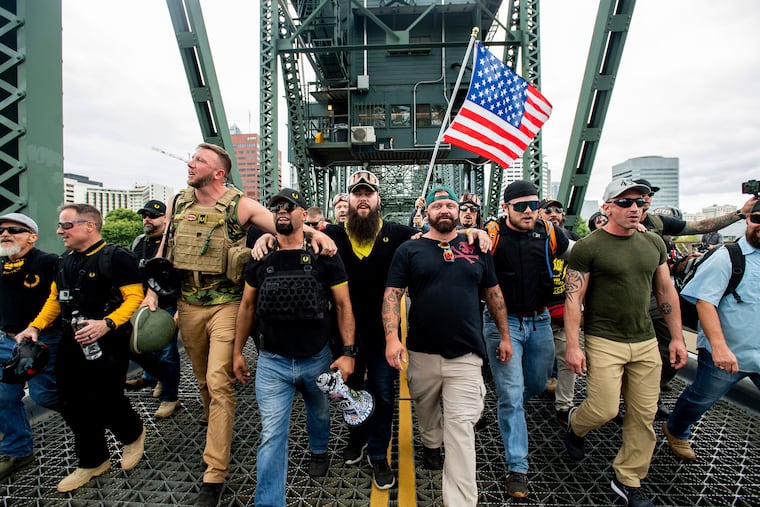Retired colonel: ‘Thank you for your service’ movement weaponizes patriotism | Perspective
The TYFYS culture’s specific emphasis on military service fosters an environment where military service members can develop a sense of entitlement—helped by a well-intentioned but overly appreciative public.

The United States has a patriotism problem — a cult of patriotism. Don’t get me wrong, it’s very nice that people express their appreciation when they learn I served in the Air Force. But enough is enough.
The “thank you for your service” (TYFYS) culture is going to backfire on the military and society. There are many reasons people decide to serve, in uniform or out, but most public servants understand that service is its own reward — and a privilege. The TYFYS culture’s specific emphasis on military service fosters an environment where service members can develop a sense of entitlement, helped by a well-intentioned but overly appreciative public.
Our patriotism problem began in the 1980s as an over-correction to the poor treatment of Vietnam veterans returning from that war. It was supercharged by the performance of our forces in Desert Storm and a later sense of victimhood and vengeance that came with 9/11. Today we see it everywhere in our society, from the ubiquitous returning soldier set piece reunions (including one during this year’s State of the Union) to the corporate version — think NFL and NASCAR, both of whom have tightly woven a particularly strident form of military adulation into their products. Service members have always been used as political props, but what we see today is unprecedented in its pervasiveness.
Politicians running for office these days literally drape themselves in the flag, and candidates who have served feature their service prominently in their campaigns. It is sometimes the first thing out of their mouths, and their campaigns are awash with visuals of the candidate in uniform or standing next to a jet. Take for example Democratic Senate candidate Amy McGrath from Kentucky, whose campaign ads focused on her Marine service. Or Arizona Republican Martha McSally, whose “patriot, warrior, leader” ad hyped her Air Force service with a montage of McSally in uniform and snippet of news coverage related to her service. Even Democratic presidential candidate Pete Buttigieg leans in to his military background on the campaign trail.
As if military service automatically makes for a better political leader. There is scant historical evidence for that. Arguably two of our finest leaders, Abraham Lincoln and Franklin Delano Roosevelt — wartime presidents at that — never served a day in uniform. George W. Bush, who did serve in the Texas Air National Guard, showed terrible judgment on the international stage.
Service to our nation is a privilege, and the military is just one of the many ways to serve. Military service is no more valuable than other forms of service. Our cops, firemen, teachers, career civil servants, and elected leaders — all deserve our gratitude and appreciation.
TYFYS has another insidious effect: It creates an environment where our military can, as a recent U.S. Special Operations Command (USSOCOM) report determined, develop an “unhealthy sense of entitlement.” There are troubling signs that a problem is brewing. Recently, our most elite forces, Green Berets and SEALs, have repeatedly been charged with war crimes, drug use, sexual assault and, in the case of a Green Beret in Mali, murder. The USSOCOM report found serious problems with “leadership, discipline, and accountability.”
It’s not a stretch to connect the dots between these findings and an overly adoring public that gives troops a sense of license. Trouble among our elite troops will make the news, but the same problems filter down into line units. And, of course it does not help when the commander-in-chief absolves them of their crimes and publicly lauds them as vindicated heroes.
Finally, perhaps the darkest consequence of this well-meaning but misguided appreciation is that it fuels the fantasies of wannabe warriors, like the Proud Boys or the Three Percenters. Kitted-out in the best assault gear mom’s paycheck can afford, these military imitators cosplay at the state capitol, harassing lawmakers and peaceful protesters. They want so much to be appreciated (and feared). They want to bask in the same glow of public appreciation service members receive. But often they can’t, so they form a “militia” and play soldier with grown-up toys. Except now these man-children are fed a toxic brew of online conspiracy theories, amphetamines, and failure.
Actors with malign intent, foreign and domestic, have weaponized patriotism. The TYFYS culture is complicit — knowingly or not. If you want to thank a service member, please do. But do it once and do it modestly. Our service members deserve your thanks, but no more than the everyday heroes walking among us.
Colonel Curtis Milam has more than 4,000 flight hours in the C-130 and has served tours at the Pentagon, NATO HQ and US Embassy, Budapest. His decorations include the Defense Superior Service Medal, the Air Medal and the Air Force Outstanding Unit award with V device for Valor.